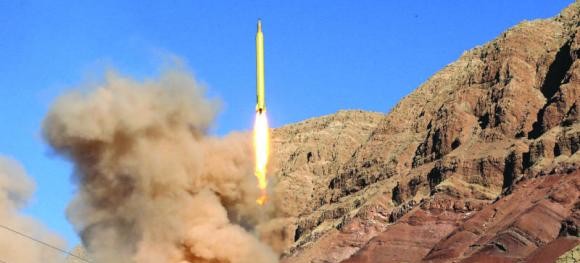PHOTO: Testing of an Iranian ballistic missile in March
LATEST
Iran has reasserted that it will not halt its testing of ballistic missiles, hours after its deputy head of armed forces confirmed the latest launch.
The Defense Minister, General Hossein Dehghan, said on Monday, “We have never pursued an invasive view and what we are doing is upgrading our country’s defensive capability. Security and development of the region are intertwined and our defense might guarantees this issue.”
Iranian media reported earlier in the day that a medium-range ballistic missile, with a range of 2,000 km (1,240 miles) was fired two weeks ago and landed within 8 meters of its target.
Citing the tests, the US has extended sanctions on Iranian companies and individuals linked to the Revolutionary Guards, despite the implementation of the July 2015 nuclear deal. Washington and European allies have also said that they will take the issue to the UN Security Council, which passed a resolution last July forbidding any tests linked to develop of nuclear capability.
Iran contends that the ballistic missiles are not covered by the resolution because they cannot carry nuclear warheads.
Defense Minister Dehghan blamed the US and Saudi Arabia for any dispute:
The Americans and the Saudis are trying to spread a climate of turmoil and tension in the region and have put so-called Iranophobia top on their agenda and attribute any event to this issue….Those who are raising such issues are overlooking maneuvers [staged] by the US on a daily basis and Saudi Arabia’s purchase of long-range missiles.
Curiously, he denied the earlier report of the latest launch, “We have had no missile test with a range published in media.”
Tasnim News had quoted the Deputy Chief of Staff of Iran’s armed forces, General Ali Abdollahi, “Two weeks ago, we tested a missile with a range of 2,000 kilometers and an error margin of eight meters.”
The White House responded with caution. Spokesman Josh Earnest said:
We’re still trying to get to the bottom of what exactly transpired. We are aware of Iranian claims of an additional ballistic missile launch….We’re also aware of statements from the defense minister indicating that such a launch did not take place.
“We Will Drown US Vessels in Persian Gulf If They Threaten Us”
In another tough statement, the commander of the Islamic Revolutionary Guards Corps’ naval forces warned that US warships will be sunk if they threaten Iran.
Rear Admiral Ali Fadavi said on State TV on Monday night:
Wherever the Americans look in the Persian Gulf, they will see us.
They know that if they commit the slightest mistake, we will drown their vessels in the Persian Gulf, the Strait of Hormuz, or the Sea of Oman.
The Revolutionary Guards have repeatedly said that they will not tolerate a US presence in Iran’s territorial waters, but there have been no clashes this year apart from the brief detention of 10 US sailors in January after their boat suffered a technical problem and drifted close to an Iranian island with a Guards complex.
The Supreme Leader elevated the rhetorical battle last week when he told teachers, “The Persian Gulf coast and much of the coasts of the Sea of Oman belong to this powerful nation; therefore we have to be present in this region, [stage] maneuvers, and show off our power.”
Fadavi insisted on Monday:
Today, there are around 60 foreign military vessels in the Persian Gulf, most of which belong to the US, France and Britain. The vessels are monitored by the IRGC every hour.
The IRGC also enjoys intelligence superiority over their aerial capabilities. They themselves know that well.
Rouhani Appeals for Unity, Talks Down Regime In-Fighting
President Rouhani has played down regime in-fighting in a speech in southeastern Iran, calling for unity after the recent Parliamentary elections.
Rouhani told the crowd in Kerman, “After the election, it is time for unity and the Parliament and Government should attempt to solve people’s problems side by side.”
He linked the appeal to his attempt — challenged by critics and even the Supreme Leader — to link the July 2015 nuclear deal to his plans for economic recovery and his foreign policy: “We came round the important historical bends with people’s unity, the Supreme Leader’s guidance, and the companionship among the branches that led us to JCPOA [the nuclear agreement].”
At the same time, he tried to appease those critics with high praise for the Islamic Revolutionary Guards Corps: “The Army of the Guardians of the Islamic Revolution has always been a pioneering force of this nation for solving the crises of the country. Today the IRGC is responsible not only for the country’s security, but also for the security of the countries’ that need Iran’s help.”
With Iran escalating its military intervention in Syria, Rouhani continued, “The IRGC is making sacrifices to defend the holy shrines and help the oppressed….The IRGC is a pioneer in defending the holy shrines in Iraq and Syria and the oppressed people in Palestine and Lebanon and other countries reaching out to Iran.”
The President specifically referred to General Qassem Soleimani, the head of the IRGC’s elite Quds Forces and Iran’s leading commander in Syria, who is a native of Kerman Province: “He brings us authority and honor.”
Further seeking to ease the in-fighting, Rouhani supported his ally, former President Hashemi Rafsanjani, who has been bitterly attacked by hardliners and some conservatives. He called Rafsanjani’s the “Supreme Leader’s old friend” and said, “He has made a lot of sacrifices in his lifetime.”

